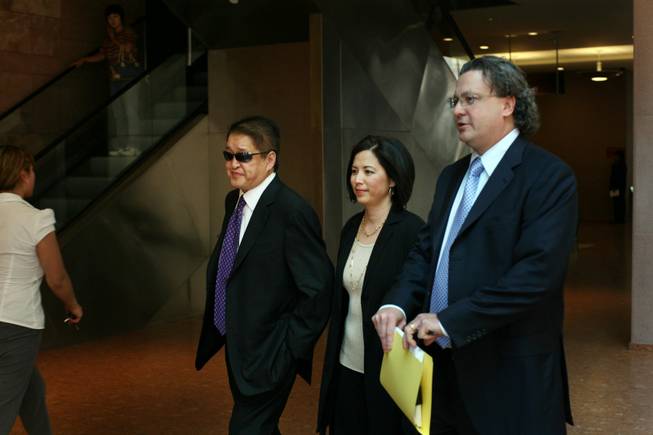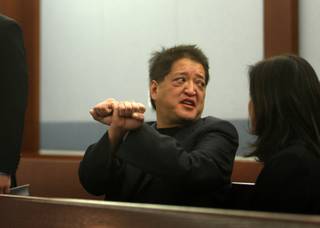
TIFFANY BROWN / LAS VEGAS SUN File
Terrance K. Watanabe, 52, left, with his sister, Pam Watanabe-Gerdes, and lawyer, David Chesnoff, leaves the Regional Justice Center on May 20.
Friday, July 17, 2009 | 2 a.m.
Sun Archives
- Grand jury indicts high roller in $14.7M casino debt case (4-29-2009)
- High roller posts $1.5 million bail to avoid jail stay (2-18-2009)
- Philanthropist allegedly owes $14.7 million to Rio, Caesars (2-4-2009)
- Feds press probe of ex-Fry’s executive (2-2-2009)
- Casino profile details luxurious lifestyle of former Fry’s executive (1-14-2009)
- Feds looking into high roller’s debt payments (12-31-2008)
In the quarter-century since the Legislature passed a law allowing authorities to prosecute unpaid gambling markers as bad checks, no one charged with failing to pay back a casino has been able to persuade a court to overturn the oft-criticized law.
But a high rolling Nebraska philanthropist facing felony bad-check charges stemming from $14.7 million in gambling debts at Caesars Palace and the Rio is mounting a legal challenge that, if successful, could open the door for other gamblers with casino debts to also attack the law. Terrance K. Watanabe, whose wealth comes from the sale of a successful Omaha-based wholesale novelty company, has the resources to take his fight to the highest levels of the legal system if necessary.
His high-powered Las Vegas defense attorney, David Chesnoff, filed papers in District Court on Thursday seeking dismissal of the criminal charges on the grounds that Watanabe’s extensive dealings with the two Harrah’s Entertainment-owned casinos in 2006 and 2007 did not fall under the bad-check statute.
Chesnoff argued that his client had a written agreement with Harrah’s in which the company agreed to withhold collection of his markers for at least 60 days and thus, under the law, the transactions are not considered bad checks payable upon demand but rather loans that can’t be prosecuted.
“Such ‘checks’ are not negotiable instruments, and their nonpayment cannot be criminalized without violating the U.S. Constitution,” Chesnoff wrote.
This “unique” agreement “distinguishes Watanabe from virtually every other gambler in Las Vegas,” Chesnoff added.
He said a handbook put out by the district attorney’s own bad-check unit even states that the unit can’t prosecute cases where checks are predated or postdated or “where an agreement was made to hold the check for later payment.”
Steve Johnson, a professor at UNLV’s Boyd School of Law, said Chesnoff’s claims could have merit.
“This is an argument that can be advanced reasonably in court,” he said. “The case against Watanabe is not a slam dunk.”
If Chesnoff prevails, his argument could have ramifications in future cases, Johnson explained. Others facing criminal charges could claim to have oral agreements with the casinos and create uncertainty about the validity of the cases against them.
But Johnson added: “Just the mere making of this argument will make the casinos extremely reluctant to enter into such arrangements in the future.”
Criminal defense lawyers who have fought bad-check cases involving casino markers for years said they also believe that Chesnoff’s argument may have “legs” in court.
Thomas Pitaro and Robert Langford have long contended that gambling markers are extensions of credit and not subject to the bad-check law because gamblers are never asked to repay the debts right away.
“When someone gives you money, and you pay it back later, it’s a loan,” Pitaro said.
Added Langford: “Casinos call it credit until it’s not paid back. Then it becomes a check, and they turn to the district attorney’s office, which has become a collection agency with a badge and a gun.”
Chief Deputy District Attorney Bernie Zadrowski, who runs the bad-check unit, has defended the unit in the past, saying it merely carries out the will of the Legislature. But he could not be reached for comment Thursday on Chesnoff’s claims in the Watanabe case.
Harrah’s Entertainment spokesman Gary Thompson declined to comment on the written agreement, saying the company has a long-standing policy of not discussing legal matters.
The agreement was the result of the enormous amounts of money that Watanabe gambled at the company’s casinos, the court papers state. Harrah’s also provided Watanabe with one of its security officers to look after his needs while he gambled and, among other perks, provided him with his own roulette table in a private area, according to casino e-mails submitted with the motion to dismiss the case.
Chesnoff has indicated that Watanabe lost a total of $112 million at Harrah’s casinos in 2007 and that with the exception of the $14.7 million, all of that money was paid back to the casinos through wire transfers.
In his court papers, Chesnoff said his client’s prolific play, making him “Harrah’s No. 1 customer” and “one of the most noteworthy gamblers in the history of Las Vegas,” resulted in “revenues totaling hundreds of millions of dollars for various Las Vegas casinos.”
Watanabe’s play amounted to 20 percent of the revenues for Caesars Palace and the Rio in 2006 and 2007, the lawyer added.
Chesnoff also argued that the charges should be dismissed against Watanabe because Zadrowski failed to inform the indicting grand jury of the written agreement and did not present other evidence favorable to the 52-year-old Watanabe.
Chesnoff wrote a seven-page letter to Zadrowski before Watanabe’s indictment in April accusing Caesars Palace and the Rio of providing Watanabe with a steady flow of alcohol and — in the case of Caesars Palace — prescription painkillers as his losses increased.
Chesnoff contended that current and former casino employees would testify on Watanabe’s behalf that the resorts kept the high roller in a constant state of intoxication in the latter months of 2007 in violation of state gaming regulations. None of the witnesses was called to testify before the grand jury.
On Thursday, Chesnoff reiterated those allegations, saying in his court papers that Watanabe “could not have possibly had the capacity to validly enter into the marker transactions, nor could he have formed the required present intent to defraud at the time when the markers were signed.”
Jeff German is the sun’s senior investigative reporter.


Join the Discussion:
Check this out for a full explanation of our conversion to the LiveFyre commenting system and instructions on how to sign up for an account.
Full comments policy